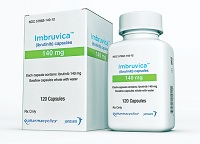AstraZeneca ($AZN) may be shelling out a pretty penny to buy a majority stake in Acerta Pharma, but it pales in comparison to the price AbbVie ($ABBV) paid for a piece of cancer med Imbruvica. And that's a therapy that Acerta may eventually one-up.
The British pharma giant announced late last week that it would lay down $2.5 billion up front for 55% of the California company, which is fielding a BTK inhibitor candidate it expects to one day face off against the hot new AbbVie drug. If it does win approval--or in 2018, whichever comes first--AZ will be on the hook for another $1.5 billion payment, and Acerta shareholders will later have the option of selling the remainder of the company to AstraZeneca for an additional $3 billion.
All told, it's a $7 billion bet that Acerta's cancer prospect--dubbed acalabrutinib--can succeed, and clinical evidence so far suggests that it can. At this year's American Society of Hematology (ASH) meeting, Acerta rolled out early-stage data showing its prospect posted a 95% response rate among patients with relapsed chronic lymphocytic leukemia (CLL). On top of that, it's so far shown a "significantly better tolerability profile" than Imbruvica--meaning it doesn't spur the side effects that sometimes force patients to discontinue use of its future rival, John Byrd, director of the hematology division at The Ohio State University School of Medicine, said in a statement.
 As such, AstraZeneca expects to see the med generate $5 billion in peak sales. And while that may not measure up to the haul AbbVie and co-owner Johnson & Johnson ($JNJ) are expecting for CLL-fighter Imbruvica--AbbVie alone expects to realize $7 billion in peak sales from its share of the med--AZ didn't have to shell out nearly as much as AbbVie did to get its hands on a piece of sales.
As such, AstraZeneca expects to see the med generate $5 billion in peak sales. And while that may not measure up to the haul AbbVie and co-owner Johnson & Johnson ($JNJ) are expecting for CLL-fighter Imbruvica--AbbVie alone expects to realize $7 billion in peak sales from its share of the med--AZ didn't have to shell out nearly as much as AbbVie did to get its hands on a piece of sales.
For its part, though, AbbVie's $21 billion bet on Imbruvica's maker, Pharmacyclics, isn't looking bad. That med put up some impressive data at ASH, too, including results that helped it build its case for first-line CLL use.
But competition for Imbruvica is the last thing the Illinois drugmaker needs. It's already facing a host of biosimilar threats to top-selling Humira; recently, Amgen ($AMGN) filed an application for its version with the FDA, and several other companies are working on copies, including Novartis ($NVS), a Baxalta-Momenta partnership, and a Merck-Samsung Bioepis effort.
- read AZ's release
Special Report: Top 20 orphan drugs by 2018 - Ibrutinib